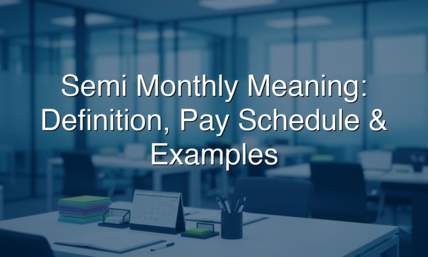How to Review Your Paychecks Before Filing Income Taxes
Earning deserved wages after completing monthly or weekly duties is a source of pride for any employee. It gives them the urge to work harder and target more in the future. Surprisingly, though, very few people understand the fundamentals of payroll. In fact, many income earners don’t have a good idea of what’s added or deducted from their paycheck every month.
Today, direct deposit has become the main method used by employers when compensating their workers. As such, it’s even a lot more difficult for one to consider going through their payments as they would when it was a paper check. However, you should still confirm that the deductions taken out of your gross income are correct. So what are the things to look into when reviewing your paycheck? Read on to learn more.

Why should you review your pay stub?
Why is it essential for every income earner to check their paycheck? For one, you need to make sure that you’re withholding the right amount of funds from your salary. This way, you won’t owe the taxman anything the following year, which will protect you from any related penalties.
Reviewing your pay stub every payday also ensures that you don’t withhold more than the required amount. Remember, the income tax rates may change occasionally. In light of the current economic state across the globe, you can expect to see even more adjustments in the coming months. That should give you enough reasons to review your paycheck every time you receive it.
How to review your paychecks
Now that you know the reasons for going through your paycheck every pay period, take a look at how you should go about this process. What are some of the things you need to confirm in your pay slip? Keep reading to find out all the answers to this question.

Review your personal information
A pay stub has four main sections, and your personal information is one of them. It might not seem much of a big deal, but any mistake here can have severe repercussions on your tax payment. Therefore, it’s imperative that you review this data keenly and make sure that your name, withholding number, filing status (single or married), and any other crucial information is correctly stated.
Check your earnings
Most people are familiar with this area because it’s the first thing they look at after receiving their paycheck. It shows the total amount earned within a given pay period, be it monthly, biweekly, or weekly. This is the most straightforward figure on your pay stub, but it’ll still need some reviewing to ascertain that you’re being compensated fairly for your work.
It’s worth noting that whatever you’ll see in this section is dependent on the nature of your contract. If you have a fixed-pay deal, then you’ll see your monthly, weekly, or quarterly salary shown in this section. Hourly workers, on the other hand, will have their hourly rate together with the total number of hours working during that pay period. All your overtime hours and/or any other bonuses will be stated here.
Of course, pay stubs may vary depending on the software used by your employer. Nonetheless, all pay slips have the following important figures in this section:
-
Gross pay: This is the amount paid to the employee based on the agreed-upon deal. It shows the total wages before any deductions are taken out. For instance, if you accept a contract of USD$4,000 per month, this is what will probably appear on the pay stub as your gross pay. However, note that this doesn’t reflect the amount you’re going to receive in your bank account.
-
Year-to-date gross: Abbreviated as YTD, year-to-date earnings, as the name suggests, is an accumulation of all your earnings since the beginning of the year. So why is this figure important on your pay slip? As an employee, you get to know the total amount you’ve earned over the months. However, it’s more important to the employers themselves because it gives them a chance to compare payroll expenses to their preset annual budget. This way, they’ll know whether their company is on the right track.

-
Net pay: This is the actual amount that you’ll receive in your bank account for a given pay period. It’s simply the gross pay minus all deductions and withholding, including federal and state taxes. This is one of the most important figures you should confirm the moment you receive your paycheck. Make sure that the value in this section corresponds with the expected calculations for that period.
Confirm the taxes
As mentioned before, many people end up paying unnecessary fines the following fiscal year because of an unidentified mistake in their paycheck. Of course, excitement will always creep in after receiving your monthly payment, and you might not be bothered to see if the correct amount was sent to the taxman. Unfortunately, ignoring this information could be costly in the long run.
What are the things to confirm in this section? Every pay stub should have at least three types of taxes: federal, state, and FICA. Here’s what you need to know about these taxes:
-
Federal taxes
Federal income tax refers to the tax levied by the Internal Revenue Service (IRS) on your annual earnings. The government withholds a certain percentage of your income every year, and the tax rate may increase as the salary increases. Unfortunately, it can be very difficult for any individual to compute their federal taxes by themselves.
How does the federal government determine how much you should pay in taxes? First, every employer is expected to report all their employees’ annual salaries together with the corresponding number of dependents.
Based on this information, the IRS works to estimate how much they should deduct from your annual salary. This value is then divided by the number of pay periods you have throughout the year. The final figure is what the taxman will deduct from your weekly, biweekly, or monthly income. Sometimes the federal income taxes may be too low or too high due to a change of occupation, the addition of a new family member, or other relevant circumstances. Therefore, to avoid overpaying or underpaying your taxes, it’s imperative that you regularly update your information accordingly.

This set of taxes work in a similar way as federal taxes. However, the calculation criteria may vary from one state to another. As such, the amount you currently pay may change significantly when you move to a different state. Every employer must send tax withholdings to the relevant authority within their region and report the same in the employee’s paycheck.
You’ll also see FICA included in the taxes section of your pay stub. This refers to the deductions channeled toward Medicare and Social Security payments. The presentation of this may vary with the pay stub software used to create the file.
Some combine the contributions from both programs while others separate the two to show how much of your money is sent to each fund. It’s still worth noting, though, that 6.2% of your income is paid to Social Security, and your employer contributes another 6.2% to make it 12.4% in total. As for Medicare, 2.9% is shared between you and the employer, who is required to pay 1.45%, while the other half is deducted from your income.
Deductions
The deductions don’t end with the aforementioned taxes. In your pay stub, you’ll need to confirm the amount set aside for health insurance payments and retirement plans. Keep in mind that these are pre-tax deductions. As such, you won’t be taxed on them, hence reducing your total taxable income.
Another thing to check in this section is the flexible spending account (FSA) contribution which is geared toward medical expense payments. Just like health insurance and retirement plans, FSA contributions aren’t taxable.

What should you do if you notice a mistake?
So you’ve noticed that some figures on your paycheck aren’t adding up. What should be your next course of action? Many people in this situation may feel frustrated, especially if the monthly bills are around the corner. While this is understandable, you need to keep calm and find someone within the company to help you, preferably one from the payroll team.
Unfortunately, sometimes mistakes might be difficult to file internally. If that’s the case, then you can go ahead and report a pay discrepancy complaint to your state labor office. The relevant authority will follow up on the case and ensure that the issue is resolved as soon as possible.
Conclusion
Everyone is excited whenever they receive their paycheck after a successful period. However, mistakes will always happen when creating these documents, which gives you enough reasons to review your earnings, personal information, and deductions every now and then. You should also confirm the tax rates used in your pay stub to ensure that it matches the current changes, if any. In case you notice any mistakes in your pay slip, it’s recommended that you find someone in your company’s payroll to look into it.















